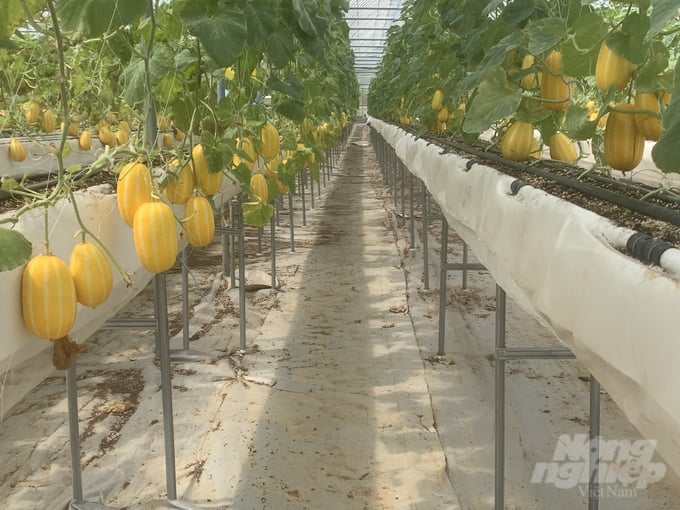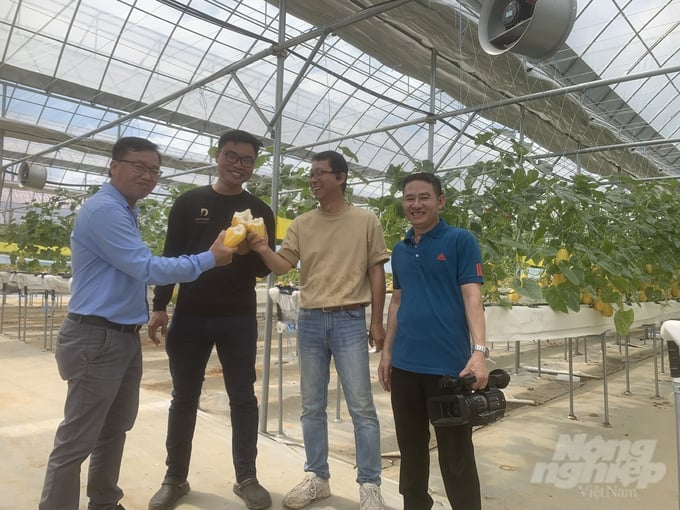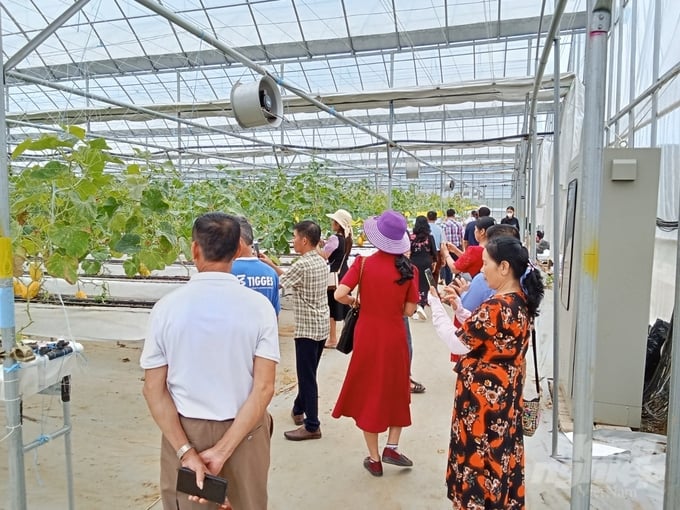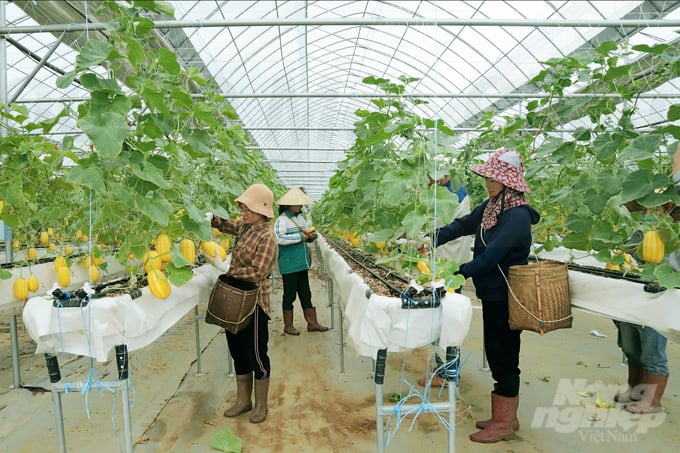June 18, 2025 | 05:50 GMT +7
June 18, 2025 | 05:50 GMT +7
Hotline: 0913.378.918
June 18, 2025 | 05:50 GMT +7
Hotline: 0913.378.918
With support from the local government and technical advancements transferred by the Vegetable and Fruit Research Institute (Vietnam Academy of Agricultural Sciences), Korean "farmer" Park DooHo invested 20 billion VND to lease 10,000m² of land in Ban Lun, Muong Sang Commune, Moc Chau District (Son La) to establish the DooHo Moc Chau High-Tech Farm. With 1 hectare of greenhouses, the farm produces nearly 30 tons of hybrid yellow melon pears (Happy 6) per crop, generating revenue of 1.4 - 1.5 billion VND.

Happy 6 hybrid yellow melon pears are currently being harvested at DooHo Moc Chau Farm. Photo: Hai Tien.
Mr. Dinh Anh Tuan, a technical officer at DooHo Moc Chau Farm, revealed that Mr. Park DooHo, the founder, achieved significant revenue by selling melon pears directly to visitors at the farm and to the Korean community living and working in Vietnam.
On the other hand, The Happy 6 hybrid yellow melon pear, developed by Vietnamese scientists from initial Korean materials, possesses excellent qualities that suit both Korean tastes and the general Vietnamese market. This variety has been widely planted in provinces such as Hai Duong, Vinh Phuc, and Hanoi. Notably, as an F1 hybrid, this melon can only be planted for one crop; using seeds from commercial melons for the next crop results in significantly lower yield and quality, or even no harvest at all.
Initially, Mr. Park DooHo invested heavily in infrastructure at DooHo Moc Chau Farm, exceeding the costs of similar farms in the area. This was due to a lack of market information on agricultural greenhouse supplies in Vietnam, leading him to import most equipment from Korea, incurring high transportation costs. Later, realizing that locally sourced materials were cheaper and of comparable quality, Mr. Park DooHo switched to using local supplies.

Dr. Park DooHo, the founder (second from the right), invites guests to enjoy fresh melons produced at the farm. Photo: Hai Tien.
Mr. Park DooHo, the founder, stated that he is an economics expert (with a PhD) and a participant in the Vietnam-Korea agricultural cooperation program, which introduced him to Vietnam in 2021.
After conducting field research, he found that the climate in Moc Chau was ideal for growing temperate and subtropical vegetables and fruits. In 2023, he decided to invest in DooHo Moc Chau Farm to grow strawberries, achieving high production efficiency. However, the climate in Moc Chau only allows for one strawberry crop from September to February, leaving the greenhouses empty for the rest of the year, which was very wasteful.
He shared this concern with Dr. Ngo Thi Hanh, the creator of the Happy 6 hybrid yellow melon pear (from the Vegetable and Fruit Research Institute). She advised him on the intensive cultivation techniques for this melon variety from March to August in Moc Chau, resulting in unexpectedly high production outcomes.
"The potential for Happy 6 hybrid yellow melon pears in the Vietnamese market is still very large. I will plant this melon variety in the next crop season following Dr. Hanh's formula (rotating 3 crops per year, including 2 melon crops and 1 strawberry crop). Additionally, I plan to expand high-tech agricultural tourism services to increase income by selling melons directly at the farm," said Mr. Park DooHo, the founder.

Visitors from all over come to tour and buy melons from DooHo Moc Chau Farm. Photo: Hai Tien.
Mr. Dinh Tuan Anh revealed that while Moc Chau has many high-tech vegetable and fruit farms, only Dr. Park DooHo's farm is the most advanced. It is equipped with automatic systems for watering, fertilizing, and controlling light, temperature, and humidity in greenhouses, ensuring optimal conditions for plant growth, resulting in high yields and excellent product quality. The farm attracts many visitors who come to experience and buy products directly at the garden.
Mrs. Pham Thi Lan, Deputy Director of the Son La Department of Crop Production and Plant Protection, noted that Moc Chau District currently cultivates 20 hectares of Happy 6 melon pears, but only 10 hectares are grown in net houses and greenhouses. Dr. Park DooHo's farm stands out due to its good seed variety, reasonable crop rotation structure, and high production technology, creating influence, spreading impact, and providing high-income jobs for some local residents.
"The province strongly encourages models like Dr. Park DooHo's. It can be considered a model that combines agricultural production with experiential and ecological tourism, allowing farmers inside and outside the province to visit, learn, and expand," Mrs. Lan said.

Local traders come to DooHo Moc Chau to pick and buy melons themselves. Photo: Hai Tien.
Currently, alongside producing hybrid yellow melon pear (Happy 6) seeds, the Vegetable and Fruit Research Institute has successfully developed grafted Happy 6 melon pears onto specialized rootstocks. These grafted plants exhibit strong resistance to root-knot nematodes and soil-borne fungal diseases, making them highly suitable for cultivation in high-tech greenhouse environments as well as directly in net houses, greenhouses, or open fields.
Translated by Mai Quang Huy
/2025/06/17/3942-2-143243_548.jpg)
(VAN) Recently, in Sweden, the Secretary of the Binh Dinh Provincial Party Committee presented the Investment Registration Certificate for the 'Polyester Fabric Recycling Complex' project to SYRE Impact-AB Company.
/2025/06/12/3721-2-202745_83.jpg)
(VAN) TH made an impression at Seoul Food 2025 with its line of natural beverages, paving the way for Vietnamese food products to enter the South Korean market.

(VAN) Soc Trang's success in rice exports stems from a strategy of developing fragrant and specialty rice cultivation areas and standardizing production toward low-emission practices.
/2025/06/11/1311-5-120811_839.jpg)
(VAN) The pig farming industry is facing the challenge of comprehensive restructuring to meet requirements for quality, safety, traceability, and market expansion both domestically and for export.

(VAN) Vietnam considers participating in ALGROALBA in order to expand agricultural production, coordinate the assessment and effective exploitation potential land.
/2025/06/05/5314-1-184727_407.jpg)
(VAN) From seemingly worthless fish scales and skin, enzymes and lactic ferments can transform by-products into peptides, opening a sustainable, effective business direction and elevating Vietnamese seafood.

(VAN) TTC AgriS and IFC signed a strategic partnership to develop a sustainable agricultural value chain, aiming to achieve the Net Zero target by 2035.